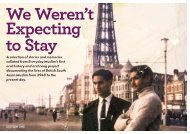Race, Faith and Community in Contemporary Britain Essays on Black, African, and African Caribbean Muslims in the UK PROUDLY MUSLIM & BLACK REPORT 2022
Black British Muslims play an important role in British society but are poorly represented in public discourse, policy, and indeed across a range of sectors. To overcome structural disadvantages and racism in society and in Muslim communities, we aim to create a platform for interventions in discourse and representation as well as in power relations. Our effort is collaborative and aimed at exploring the diversity, contributions, heritage, as well as the history of Black British Muslims. Our objective in this report is to create a platform to review and consider the current state of race and power relations, while creating networks and partnerships. In short, bringing Black British Muslim voices to the forefront is to work towards inclusion and belonging in British society and importantly, in British Muslim communities.
Black British Muslims play an important role in British society but are poorly represented in public discourse, policy, and indeed across a range of sectors. To overcome structural disadvantages and racism in society and in Muslim communities, we aim to create a platform for interventions in discourse and representation as well as in power relations. Our effort is collaborative and aimed at exploring the diversity, contributions, heritage, as well as the history of Black British Muslims. Our objective in this report is to create a platform to review and consider the current state of race and power relations, while creating networks and partnerships.
In short, bringing Black British Muslim voices to the forefront is to work towards inclusion and belonging in British society and importantly, in British Muslim communities.
Create successful ePaper yourself
Turn your PDF publications into a flip-book with our unique Google optimized e-Paper software.
Community Recognition
The Black Muslim Festival was billed as ‘a celebration of the Black Muslim heritage, culture and
experience and served to not only uplift Muslims of African descent worldwide, but to offer an
intriguing cultural experience for non-Black audiences.’
Set to run throughout October, it represented an essential contribution to the narrative of
Black history and Black identity in the UK, one that often excludes the voices of Black Muslims.
Indeed, The Voice, a Black British newspaper, was one of the first media outlets to cover the
festival, a rare recognition of Black Muslims as part of the wider Black British community.
Indeed, the Black Muslim Festival is notable because it has garnered the support, not only
of Black Muslims from the UK, USA, Canada and the African continent but also non-Black
Muslim and mainstream media. Apart from The Voice, articles and interviews about the festival
appeared in The Guardian, Metro, Al Jazeera, TRT World and the Indonesian newspaper,
Republika, as well as some of the most popular Islamic media sites: The Muslim Vibe, Islam
Channel, British Muslim Magazine and mvslim.com.
Feature in The Guardian.jpg
In the wake of a concerted public relations campaign, in which the organisers reached out
via personal and professional networks, several Muslim charities were quick to offer support
and sponsorship, including the Muslim Council of Britain, Muslim Hands, Mercy Mission and
My Adoption Family, allowing speakers to be compensated and staff hours paid for. This is
an important and crucial development in the Black African and African Carribean Muslims
(BAACBM) journey towards inclusion in the wider Muslim community: securing moral and
financial support from non-Black members of the Muslim community shows that our
contributions are seen as valuable.
The main poster for the Black Muslim Festival.jpg
The Global Black Muslim Identity
Another notable difference between the Black Muslim Festival and other similar events is the
international nature of the line-up. Scholars, academics, activists, creatives and experts, in
a diverse range of disciplines, from the UK, US, Canada, and the African continent, were all
featured on the programme. The audience was similarly diverse, with the UK boasting the
highest numbers of registrants, followed by Nigeria, the United States, Canada, then South
46 47





